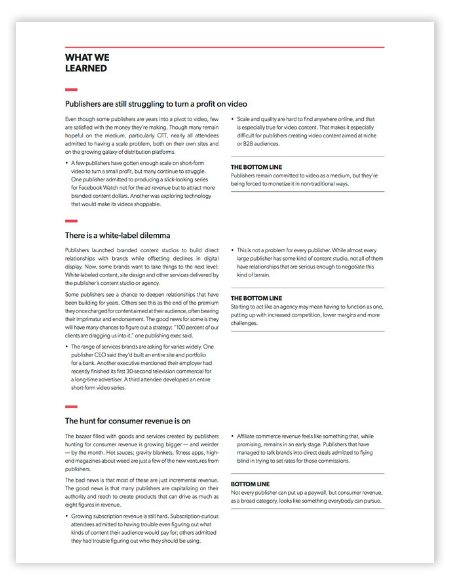Secure your place at the Digiday Media Buying Summit in Nashville, March 2-4
‘The hunt for consumer revenue is on’: Insights from the Digiday Publishing Summit
Nobody knows if consumer revenue, branded content, commerce, or events will make up for losses in the display ad market. But that isn’t stopping publishers from trying.
At Moguls and the Digiday Publishing Summit in Key Biscayne, Fla., strong interest in alternative forms of revenue stood out: News publishers leaned into commerce working groups; lifestyle publishers talked about launching their own lines of wellness products, and legacy media giants discussed turning their super-fans into consumers. Digiday+ members can download an in-depth Event Briefing below, detailing highlights, key conversations and new tactics and strategies from the three-day summit.
Three key themes emerged over the course of the event
Publishers are still struggling to turn a profit on video
Even though some publishers are years into a pivot to video, few are satisfied with the money they’re making. Though many remain hopeful on the medium, particularly OTT, nearly all attendees admitted to having a scale problem, both on their own sites and on the growing galaxy of distribution platforms.
There is a white-label dilemma
Publishers launched branded content studios to build direct relationships with brands while offsetting declines in digital display. Now, some brands want to take things to the next level: White-labeled content, site design and other services delivered by the publisher’s content studio or agency.
The hunt for consumer revenue is on
The bazaar filled with goods and services created by publishers hunting for consumer revenue is growing bigger — and weirder — by the month. Hot sauces; gravity blankets, fitness apps, high-end magazines about weed are just a few of the new ventures from publishers.
Digiday+ members can access the full Event Briefing below:
More in Marketing

WTF are tokens?
When someone sends a prompt or receives a response, the system breaks language into small segments. These fragments are tokens.

AI is changing how retailers select tech partners
The quick rise of artificial intelligence-powered tools has reshaped retailers’ process of selecting technology partners for anything from marketing to supply chain to merchandising.

YouTube’s upmarket TV push still runs on mid-funnel DNA
YouTube is balancing wanting to be premium TV, the short-form powerhouse and a creator economy engine all at once.






